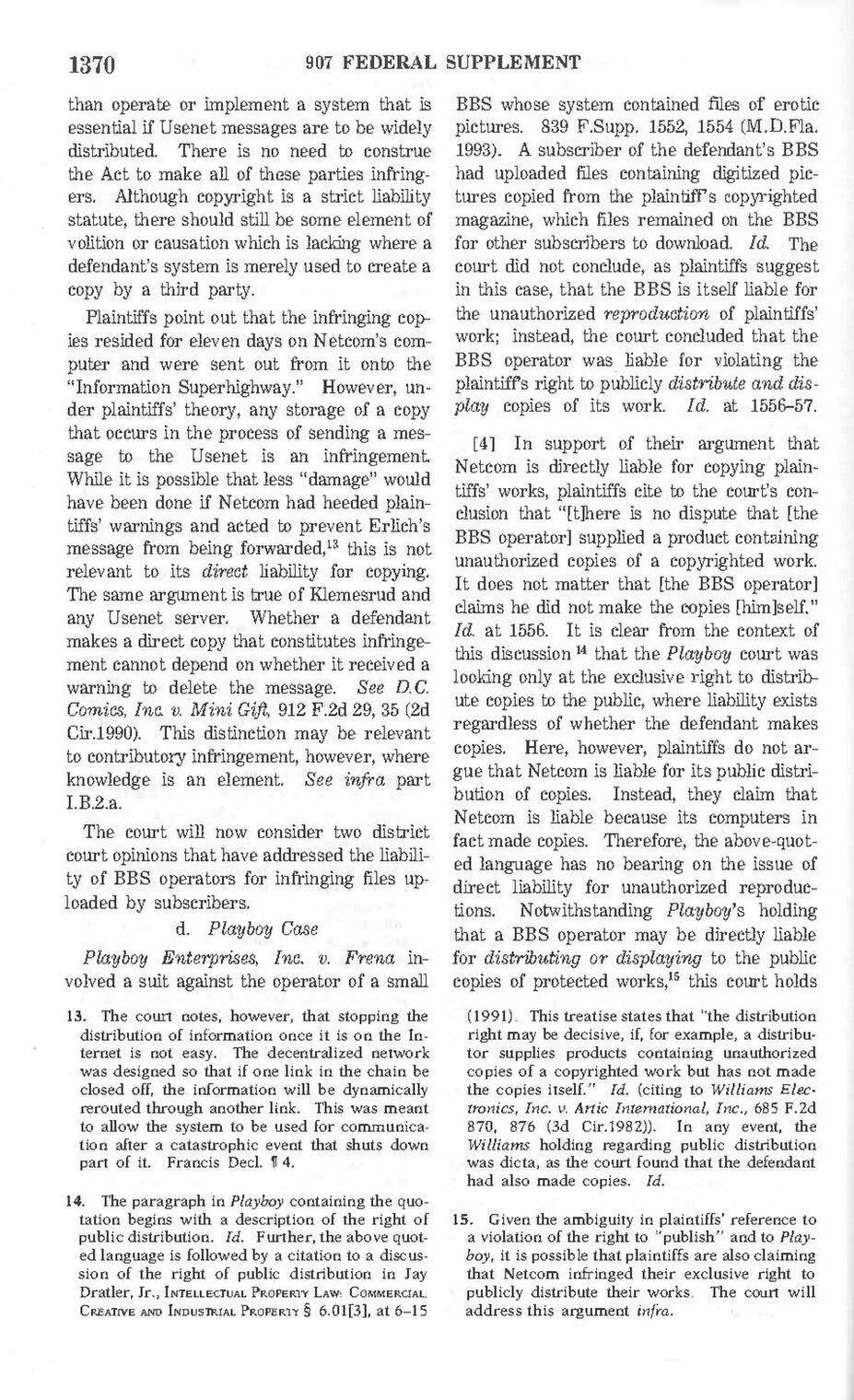than operate or implement a system that is essential if Usenet messages are to be widely distributed. There is no need to construe the Act to make all of these parties infringers. Although copyright is a strict liability statute, there should still be some element of volition or causation which is lacking where a defendant’s system is merely used to create a copy by a third party.
Plaintiffs point out that the infringing copies resided for eleven days on Netcom’s computer and were sent out from it onto the “Information Superhighway.” However, under plaintiffs’ theory, any storage of a copy that occurs in the process of sending a message to the Usenet is an infringement. While it is possible that less “damage” would have been done if Netcom had heeded plaintiffs’ warnings and acted to prevent Erlich’s message from being forwarded,[1] this is not relevant to its direct liability for copying. The same argument is true of Klemesrud and any Usenet server. Whether a defendant makes a direct copy that constitutes infringement cannot depend on whether it received a warning to delete the message. See D.C. Comics, Inc. v. Mini Gift, 912 F.2d 29, 35 (2d Cir.1990). This distinction may be relevant to contributory infringement, however, where knowledge is an element. See infra part I.B.2.a.
The court will now consider two district court opinions that have addressed the liability of BBS operators for infringing files uploaded by subscribers.
d. Playboy Case
Playboy Enterprises, Inc. v. Frena involved a suit against the operator of a small BBS whose system contained files of erotic pictures. 839 F.Supp. 1552, 1554 (M.D.Fla.1993). A subscriber of the defendant’s BBS had uploaded files containing digitized pictures copied from the plaintiff’s copyrighted magazine, which files remained on the BBS for other subscribers to download. Id. The court did not conclude, as plaintiffs suggest in this case, that the BBS is itself liable for the unauthorized reproduction of plaintiffs’ work; instead, the court concluded that the BBS operator was liable for violating the plaintiff’s right to publicly distribute and display copies of its work. Id. at 1556–57.
In support of their argument that Netcom is directly liable for copying plaintiffs’ works, plaintiffs cite to the court’s conclusion that “[t]here is no dispute that [the BBS operator] supplied a product containing unauthorized copies of a copyrighted work. It does not matter that [the BBS operator] claims he did not make the copies [him]self.” Id. at 1556. It is clear from the context of this discussion[2] that the Playboy court was looking only at the exclusive right to distribute copies to the public, where liability exists regardless of whether the defendant makes copies. Here, however, plaintiffs do not argue that Netcom is liable for its public distribution of copies. Instead, they claim that Netcom is liable because its computers in fact made copies. Therefore, the above-quoted language has no bearing on the issue of direct liability for unauthorized reproductions. Notwithstanding Playboy’s holding that a BBS operator may be directly liable for distributing or displaying to the public copies of protected works,[3] this court holds
- ↑ The court notes, however, that stopping the distribution of information once it is on the Internet is not easy. The decentralized network was designed so that if one link in the chain be closed off, the information will be dynamically rerouted through another link. This was meant to allow the system to be used for communication after a catastrophic event that shuts down part of it. Francis Decl. ¶ 4.
- ↑ The paragraph in Playboy containing the quotation begins with a description of the right of public distribution. Id. Further, the above quoted language is followed by a citation to a discussion of the right of public distribution in Jay Dratler, Jr., Intellectual Property Law: Commercial, Creative and Industrial Property § 6.01[3], at 6-15 (1991). This treatise states that “the distribution right may be decisive, if, for example, a distributor supplies products containing unauthorized copies of a copyrighted work but has not made the copies itself.” Id. (citing to Williams Electronics, Inc. v. Artic International, Inc., 685 F.2d 870, 876 (3d Cir.1982)). In any event, the Williams holding regarding public distribution was dicta, as the court found that the defendant had also made copies. Id.
- ↑ Given the ambiguity in plaintiffs’ reference to a violation of the right to “publish” and to Playboy, it is possible that plaintiffs are also claiming that Netcom infringed their exclusive right to publicly. distribute their works. The court will address this argument infra.
